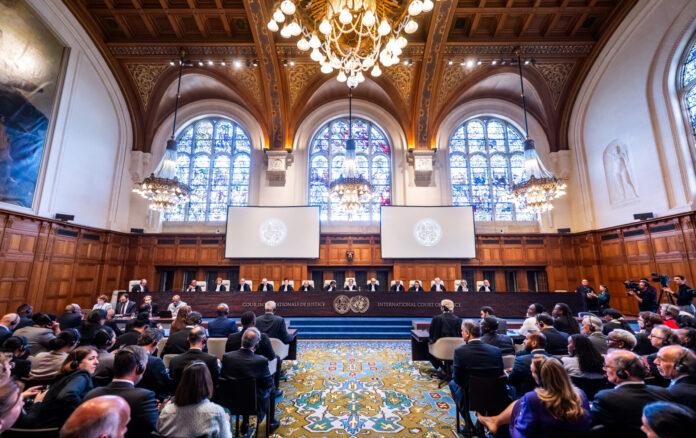Yesterday marked a historic moment in the fight for climate justice. The International Court of Justice delivered its advisory opinion on states’ climate obligations, and the message is clear: climate action is not optional, it is a legal obligation. After years of advocacy and legal proceedings, the world’s highest court has now provided unprecedented clarity on what nations must do to address the climate crisis.
What does this Ruling change?
The ICJ’s comprehensive opinion establishes several groundbreaking principles that fundamentally alter the landscape of international climate law. The ICJ affirmed that states have a binding duty to:
- Protect the climate system from greenhouse gas emissions
- Limit global warming to 1.5°C above pre-industrial levels
- Regulate businesses’ climate impacts, including fossil fuel production and subsidies
- Ensure a “clean, healthy and sustainable environment” as a fundamental human right
Most significantly, the Court recognized that historical high emitters bear greater responsibility, and that climate-vulnerable nations may be entitled to reparations.
From law students to International Supreme Court
This victory began with an extraordinary act of courage. In 2021, 27 Pacific Island law students launched an initiative that would become the largest case in ICJ history. Their campaign inspired Vanuatu to champion the cause, eventually securing support from 130 nations for a UN General Assembly resolution requesting the ICJ’s advisory opinion. What started as a student discussion about climate vulnerability transformed into a global movement that captured the attention of the world’s most prestigious legal institution.
The case eventually drew written statements from 91 countries and organizations, with 97 states participating in oral proceedings. This unprecedented level of engagement demonstrates the universal recognition that climate change transcends borders and requires collective legal clarity.

Beyond advisory: the Real-World Impact
While the ICJ’s opinion is technically advisory and non-binding, international legal experts emphasize that this ruling creates powerful precedents that will reshape climate litigation worldwide. Climate advocates now have authoritative legal backing for cases in national courts. When governments fail to meet their climate commitments, activists can point to the ICJ’s clear statement that such failures may constitute “internationally wrongful acts.”
Companies operating in high-emission sectors face increased legal exposure. The ruling makes clear that states must regulate private sector emissions. Climate-vulnerable nations now have stronger legal grounds for demanding action from high emitters.
In order to move forward, civil society organizations must leverage this ruling to demand stronger climate policies from their governments. The legal clarity removes excuses for inaction and provides powerful tools for accountability campaigns.
Climate-vulnerable populations, particularly in small island developing states, need continued support to pursue legal remedies and adaptation measures. The recognition of potential reparations creates new possibilities for climate finance and justice.
The private sector must recognize that the legal landscape has fundamentally shifted. Companies that continue business-as-usual approaches to emissions face increased regulatory and legal risks.
The ruling emphasizes that climate change requires collective action. Nations must strengthen cooperation mechanisms and ensure that climate commitments reflect the urgency the Court has recognized.
An Ongoing Mission
As we reflect on this landmark decision, it’s worth remembering the journey that brought us here. From Pacific Island students refusing to accept an unjust status quo, to vulnerable nations demanding a voice on the world’s biggest stage, to legal experts crafting arguments that would reshape international law, this victory belongs to everyone who refused to give up on climate justice. The world’s highest court has spoken with unprecedented clarity: protecting our climate is not just a moral imperative, but a legal obligation that binds all nations.
Now the real work begins. We must ensure these legal obligations become a lived reality through policy implementation, corporate accountability, and continued support for communities on the frontlines of climate change. The ICJ has opened a door to climate justice. It’s now up to all of us to walk through it.
The Jesuit European Social Centre remains committed to supporting faith-based initiatives in ecological advocacy for climate justice. This historic ruling strengthens our collective efforts to care for our common home, and protect the rights of current and future generations.
Stella Cheng
JESC Comms Officer





